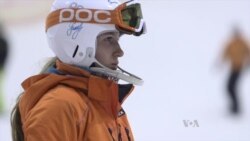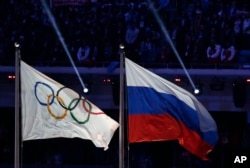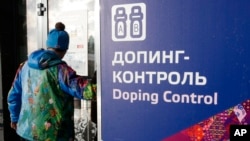Russia spent $50 billion on the 2014 Sochi Winter Olympics, making it the most expensive in history and among the most impressive. Russia dominated the Sochi games, winning 33 medals and attracting a new generation of winter sports fans.
“At the moment Sochi is a resort that is easily accessible, and people want to ski there, so after the Sochi Olympics it has become more popular,” says skiing instructor Igor Minayev at Moscow’s indoor Snezhkom ski slope.
“Skiing and snowboarding have become more popular,” he added as a small but steady stream of skiers and snowboarders made their way up the slope on a Monday afternoon.
‘That would hurt’
But a second investigation by the World Anti-Doping Agency could see some of Russia’s Sochi champions stripped of glory. The results are expected to be released in December, putting Russia’s Winter Olympic athletes at risk of punishment, including possibly losing medals won at the 2014 Sochi Games.
“That would hurt as I understand that politics are connected with this,” says amateur snowboarder Natalya. “I will still cheer, and hope for more justice.”
Russia defiantly held its own “Olympics Day” after its athletics team was banned from Rio’s summer games in August over allegations of state-run doping.
The scandal’s timing, as tensions with the West spike over Russia’s actions in Ukraine and Syria, leads some Russians to believe in conspiracy theory and rumors. “On the other hand, I have heard that many sportsmen in the United States are officially allowed to engage in doping,” says snowboard instructor Ilya Isachenko. “That strikes a warning note.”
‘Anti-Russian action’
Some Russian officials and state media have also called the doping allegations part of an anti-Russia plot.
“There turned out to be something like 50 or 60 Russian sportsmen out of a total of 400 (world-wide involved in doping such as meldonium) and an outcry started that this is an ‘anti-Russian action,’” says Russian sports journalist Valery Vinokurov. “How can you possibly call that an ‘anti-Russian’ action? What do we do then with the 350 (sportsmen) left?”
Russian officials deny state involvement. But just before the World Anti-Doping Agency releases its findings, Russian officials associated with the scandal have quietly resigned, including Russia’s Olympic Committee head, Alexander Zhukov.
Russia’s sports minister, Vitaly Mutko, named as a top figure in the scheme, was promoted to a new position, as deputy prime minister for sport, tourism and youth policy.
Growing acknowledgment
“There has never been a negative attitude to doping in our country,” says Vinokurov. “One was sympathetic to everybody. Nobody was seriously punished. The international sanctions were naturally accepted and observed, but nobody was punished.”
But more Russian athletes are acknowledging that widespread doping is a problem that needs to be addressed.
“Yes, there used to be a medication that we all took when I was a player,” says amateur and kids hockey coach Ostap Krivchenko. “It is not allowed for use now. It helps the heart. Those who did not succeed in stopping to use it in time, could not participate in important competitions like the world championship or world junior championship.”
Krivchenko says half his young players, although now just kids aged 6-7 years, want to one day become champions.
To achieve those dreams, he says, players need to train hard, be aware of forbidden drugs, and not make the same mistakes as players of his era did.










